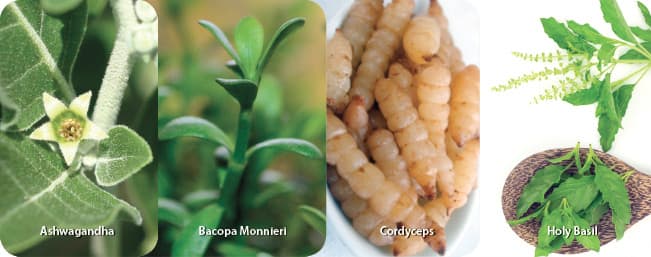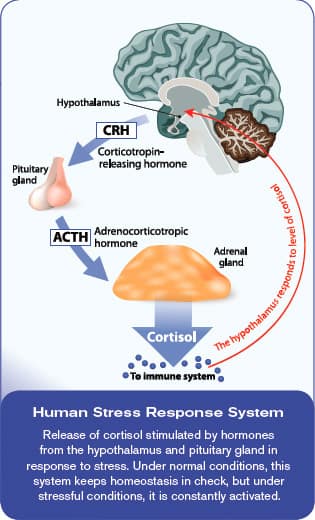Fight Stress and Support Adrenals with Adaptogens

It would be impossible to overstate the devastating impact chronic stress has on Americans’ health. As many as 75% to 90% of primary care physician visits may be related to acute or chronic stress.1
Chronic stress can be harmful to our emotional and physical well-being. It increases the risk for cardiovascular disease, diminished immune function, impaired cognitive function, and depression—and evidence shows that it contributes directly to accelerated aging and premature death.1-4
We now recognize that chronic stress leads to a body-wide imbalance of critical hormones and other essential signaling molecules. While eliminating stress is not practical in today’s society, it is possible to restore the body’s natural hormonal balance and reduce the impact of stress on cells, tissues, and organs throughout the body.1
Adaptogens are nutrients that have been used for thousands of years to help counteract the negative effects of stress by restoring the body’s natural balance.
Modern research has now confirmed that specific adaptogens can help the body fight the harmful biochemical and emotional effects of stress. The result is improved mood, greater energy, reduced incidence of chronic disease, and increased longevity.5,6
In this article, we’ll discuss the four adaptogens best-suited to help naturally neutralize the effects of chronic stress.

How Chronic Stress Affects the Body

The human body is well-equipped to respond to short-term, acute stress. It has a built-in alarm system that, when triggered, releases a surge of hormones that are designed to help ensure survival.
But chronic, unrelenting stress can wreak havoc on the body. Chronic stress leads to higher risk for cardiovascular disease and diminished immune function. It also causes harmful shifts in the human gut microbiome, the community of trillions of bacterial cells in our intestinal tracts that are intimately involved not only with intestinal health but also with normal balance and metabolism throughout the body.1,7,8
Studies show that psychological stress is the strongest risk factor that predicts future cardiac events—including heart attacks—in people with existing coronary artery disease.9 And it leads to serious impairment of immune function, leaving us at major risk for cancers or severe viral infections.1,10,11
There is also evidence that chronic stress directly contributes to accelerated aging and premature death.2-4
One recent alarming study showed that stress is associated with shortened telomeres. As most of you know,telomeres are stretches of DNA at the end of chromosomes that shorten with aging and can contribute to cellular senescence, or cell aging.4
One of the main reasons why chronic stress is so harmful is because it causes fundamental shifts in the way our cells maintain their balanced function, called homeostasis.12 This imbalance makes us feel edgy, tired, or depressed. It has even been associated with obesity, diabetes, osteoporosis, hypertension, cardiovascular disease, infectious disease, cancer, gastrointestinal complaints, neurological disorders, sexual dysfunction, psychological problems, suppressed immunity, and more.4,5,12-15
How to Protect Against Chronic Stress
It is nearly impossible to eliminate stress from our lives, which makes it important to supply our bodies with the tools necessary to protect against the long list of consequences stress can produce.
Substances called adaptogens have been used for hundreds—and some, even thousands—of years to help restore balance to the body, counteracting the harmful effects of chronic stress.
While adaptogens are not primary stress relievers, what they do is help to naturally fight the harmful effects stress has on the body. Studies show this leads to improved mental and physical performance, reduced incidence of chronic disease, and increased longevity.5,6
We’ve included in this article the latest information on nutrients with adaptogenic properties best suited for rebalancing the body’s stress responses.
Let’s look at each of them individually.
WHAT YOU NEED TO KNOW
 |
Adaptogens Combat Effects of Chronic Stress
- Chronic stress can underlie many of the diseases we associate with aging.
- Chronic stress can lead to imbalances in metabolic processes throughout the body that can accelerate aging.
- Adaptogens can help the body rebalance its hormones and neurotransmitters, resulting in significant protection against stress.
- Ashwagandha, bacopa, cordyceps, and holy basil each work by different mechanisms to help the body adapt and protect itself against chronic stress, balancing cortisol levels and supporting adrenal gland function.
- People under chronic stress should consider supplementing with these nutrients as a means of restoring a healthy balance in their bodies and protecting themselves against the deleterious effects of stress.
Ashwagandha Improves Strength and Endurance
Ashwagandha (Withania somnifera) has been used for millennia as an adaptogenic herb in the Indian Ayurvedic system of medicine.16 In that system, it is considered a Rasayana, or tonic, that can improve endurance and stamina, promote longevity, improve immunity, and enhance fertility.16,17
In animal studies, ashwagandha root extract has been found to improve measures of immune function and increase endurance. It has also been shown to prevent stress-induced gastric ulcers, reduce the inflammatory response to foreign proteins, and improve body weight lost as a result of stress.16
Recent studies in humans have confirmed ashwagandha’s adaptogenic ability to improve the body’s response to chronic stress—particularly in the area of physical activity.
Moderate exercise has multiple health benefits, but it also induces injury from muscle cell damage and inflammation. There is an important role, therefore, for adaptogens such as ashwagandha in mitigating exercise-induced stress.
Villagers living high in the Himalayas have used adaptogens for centuries to enhance their resistance to the effects of oxygen deprivation and to boost their endurance from strenuous tasks.18 Now, modern research offers solid evidence that ashwagandha helps improve the body’s response to stressful exercise and resistance training.
In one study, healthy athletic adults taking ashwagandha (300 mg twice daily) experienced a 2-fold increase in their oxygen consumption after 12 weeks, compared with placebo recipients.17 Increased oxygen consumption is an indicator of improved cardio-respiratory endurance. The supplemented subjects also experienced significant improvement in quality of life scores, compared with the placebo group.
A second study confirmed and extended these findings.19 Subjects taking ashwagandha root extract (300 mgtwice daily) showed remarkable improvements in muscle strength compared to placebo recipients. After just eight weeks of training:
- Supplemented men bench-pressed 101.2 pounds, compared to only 58 pounds in the placebo group,
- On leg-extension exercises, supplemented men could lift 31.9 pounds, compared to 21.6 pounds in the placebo group, and
- Muscle size grew significantly more in the supplemented group than in the placebo group.
Most telling of ashwagandha’s adaptogenic properties were the biochemical findings. Compared to the placebo recipients, men taking ashwagandha experienced greater reduction of exercise-induced muscle damage, greater decrease in body fat percentage, and a whopping 4.3-fold increase in testosterone levels.
These studies are a powerful demonstration of ashwagandha’s ability to relieve the physiological effects of physical stress.
Bacopa Improves Cognitive Performance
Bacopa monnieri (also called brahmi, or water hyssop) is an herb native to South Asia. It has a lengthy history in Ayurvedic medicine for use in the treatment of cognitive impairment and nervousness, both of which are closely related to stress.20-22 Early studies have validated its adaptogenic effects in animal models, and recent human studies have demonstrated its practical impact in those suffering from chronic stress.
For example, one study showed that when rats were subjected to either acute or chronic stress they experienced an imbalance in their blood cortisol levels and in the levels of “fight-or-flight” neurotransmitters in their brains. Treatment with bacopa extracts helped to normalize these stress-induced changes, confirming its adaptogenic ability. Bacopa has also been shown to help protect against the depressive effects of chronic stress, help prevent the brain degeneration that arises from chronic stress,23 and help fight the harmful effects of oxidative stress that can be caused by emotional and physical stresses.22
Impressive animal studies like these inspired human research into bacopa as a valuable stress-protective adaptogen—and the results did not disappoint. One study showed that bacopa (125 mg twice daily) produced significant improvements in mental control, logical memory, and learning.21
Another study showed that bacopa can provide protective effects against multitasking, an inherently stressful activity that can cause deterioration in cognitive performance. In this human study, bacopa extracts improved both cognitive performance and mood in as little as one to two hours.24
Together, these results demonstrate that bacopa has powerful adaptogenic effects, both in its ability to regulate cortisol levels during stress and in its ability to improve cognitive performance in those facing chronic stress.
Cordyceps Improves Immune Function
Cordyceps is a versatile medicinal mushroom that has been used as an adaptogen and health promoter for centuries. It is notable for its ability to battle oxidative stress and inflammation, and extracts of the cordyceps fungi have been shown to help enhance immune function in animals facing stress.25-29
This is critical, since diminished immune function is one of the primary consequences of chronic stress, and has been shown to leave us at major risk for both cancer and severe viral infection.1,10,11
Cordyceps’s impact on other types of physiological stress is no less dramatic. For example, in mice subjected to a forced swimming test, cordyceps polysaccharide treatment significantly prolonged swimming time (a measure of endurance), increased natural protective systems in blood and tissue, and lowered markers of oxidized cells.29
Another common effect of chronic stress is depression. Cordycepin, the major bioactive component of cordyceps, has been shown to have antidepressant-like effects in mice subjected to chronic mild stress.30Prior to treatment with cordycepin, the chronic stress induced depression-like symptoms, reduced levels of brain-derived neurotropic factor (BDNF), a growth factor for brain cells, and decreased serotonin and dopamine in the brain. But when animals received a cordycepin supplement, their behaviors normalized, as did all of the imbalanced neurotransmitters and elevated markers of stress. The low levels of BDNF also rose significantly, especially in the hippocampus, the brain’s memory/cognition center.
These results demonstrate that cordyceps extracts have adaptogenic effects with a focus on improved immune function, an essential feature for any supplement aimed at protecting the body from the long-term effects of stress.
WHAT ABOUT ADRENAL FATIGUE?
 |
Although not a diagnosis recognized by the conventional medical establishment, some innovative doctors characterize “adrenal fatigue” as a condition that shares some symptoms with Addison’s disease, such as tiredness, depression, muscle pain, poor concentration, low blood sugar, craving for stimulants, and difficulty sleeping. However, in adrenal fatigue it is thought that the adrenal glands are unable to perform, normally due to exposure to chronic stress.39
Life Extension® believes that symptoms often attributed to “adrenal fatigue” arise from multifactorial pathological processes involving, among other systems, the hypothalamic-pituitary-adrenal (HPA) axis, and that these conditions must be treated as such.
Holy Basil Protects Against Stress-Induced Anxiety and Depression

Holy basil (Ocimum sanctum), also known as tulsi, is an aromatic plant that has been used for more than 3,000 years in Ayurvedic medicine. It is considered by many experts to be the preeminent adaptogen of Ayurvedic medicine.31 Now, modern science has confirmed holy basil’s adaptogenic ability to protect the body against the effects of chronic stress.
The leaf extract of the plant contains several novel compounds that have been shown to normalize high blood sugar and cortisol levels while reducing markers of stress-induced tissue breakdown and excessive adrenal gland size.32 It also provides strong protection against oxidative and radiation stress on cells, which can affect many aspects of human health.33,34
Importantly, animal studies show that holy basil helps the body maintain homeostasis of the stress hormone cortisol.35 It rebalances mood-associated neurotransmitters in the brain—specifically ones that can produce feelings of hopelessness, which is a key component of stress-induced depression.36
Human studies show that holy basil protects against the psychological effects of stress. In one study, holy basil extract (500 mg twice daily) significantly reduced the severity of generalized anxiety disorder, stress, and depression in middle-aged adults. It also improved the “willingness to adjust,” an important psychological characteristic that helps people adapt to circumstances beyond their control.37
Taking this adaptogenic impact of holy basil one step further, in a human study, researchers demonstrated that 300 mg a day of holy basil leaf extract produced a significant improvement in many different cognitive parameters, including reaction time and error rates on standardized tests, as well as on a test that measures anxiety.38
These findings together highlight the importance of holy basil as an adaptogen capable of controlling the anxiety and depressive effects of chronic stress.
Summary
Chronic stress is an important factor in Americans’ lives today. In addition to the unpleasant feelings and mood that it can cause, chronic stress also underlies many of the disorders associated with aging.
The impact of chronic stress on the adrenal gland can be enormous, causing the gland to pump out constant, high levels of stress-adaptive hormones. Over prolonged periods, these hormones, particularly cortisol, produce undesirable consequences—including weight gain, diabetes, and immunosuppression—which can become contributors to further health problems on their own.
We can now help protect our bodies against the impact of chronic stress by using a group of adaptogenic nutritional supplements. Ashwagandha, bacopa, cordyceps, and holy basil have each been in use for hundreds to thousands of years as powerful adaptogens that influence the brain and its stress responses. Each acts by a different mechanism, and each has now been shown to significantly attenuate the effects of chronic stress, resulting in improved mood, greater energy, and better adaptability to the stressful circumstances of life.
Anyone living with the effects of chronic stress should consider supplementing with these proven, stress-relieving adaptogens in order to protect their hormonal status and adrenal glands.
By Steven Locke
Article extracted from Life Extension Magazine


Social Login